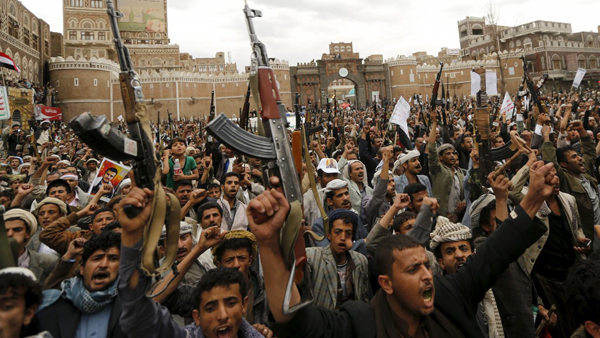As the manifold crises in the Middle East are further deteriorating and Afghanistan trying to bring the Taliban on negotiation table, the Afghan government seems to be hastily repositioning itself to take new approaches towards its relations with the Muslim world powers. There have been rapid changes in the Afghan government foreign policies after the new national unity government came to power. Since then, the tensions between Afghanistan and Pakistan have seen a sharp fall and the two governments have set a new course of cooperation on the Afghan peace efforts. In recent months, Afghan officials have paid several visits to Pakistan and the Saudi Arabia.
As the Islamic State and Huthi Shias’ wars are raging in Iraq and Yemen amidst tense rivalries between Riyadh and Tehran, according to the reports, President Ashraf Ghani has recently assured the Saudi Arabia of Kabul’s support to the Saudi state regarding the new threats emerging in the region. The move by President Ghani was criticized by some in the politics and social media, suggesting the move as a shift from his predecessor’s policy of neutrality towards the major powers of the Muslim world. The recent statement of the Afghan government regarding its support to the Saudi Arabia regarding threats emerging from regional conflicts including the Yemen conflict highlights Kabul policies towards the Muslim dominant players. Afghanistan’s tacit support to Saudi Arabia and the Yemeni government of Abdul Rabbuh Mansoor Hadi which is at war with the Huthi rebels have raised questions whether there is a substantial shift in Kabul’s policy towards the regional powers.
Other than the Islamic State threat in the Arab and Muslim world, the other face of the conflicts in Arab countries is the rivalries between Iran and Saudi Arabia, two Muslim rival powers. As the internationally-backed campaign against Islamic State in Iraq is going on, Saudi Arabia is unhappy with Iran’s dominant presence in the fight against IS in some parts of Iraq. Elsewhere in Yemen, the allegedly Iranian-backed Huthis’ rapid advances have prompted an air campaign against the group by a Saudi-led coalition.
Afghanistan has mostly been on the safe side in last fourteen years regarding the Iran-Saudi Arabia rivalries in the Muslim world. In last thirteen years, the Afghan government managed to have friendly relations with both Saudi Arabia and Iran. Despite being a mixed Shia-Sunni country, sectarian and religious divisions remained low and Afghanistan had supports of both countries in the fight against the Taliban insurgency.
The recent flare-up of Shia-Sunni tensions in the Muslim world and rise of Islamic State militants has worried many in Afghanistan. Some presence of the IS affiliated groups are confirmed in some provinces. However, the government of Afghanistan does not seem to consider possible sectarian tensions in Afghanistan a substantial threat in the country as both the leaders and mainstreams of Afghanistan’s Shias and Sunnis are almost unanimously against the Islamic State group’s presence or any kind of Shia-Sunni divisions in Afghanistan. Despite some unpredictable challenges and the fears of possible birth of Islamic State group in the country, Afghanistan is one of the few countries who are not direly and so much directly affected from the recent years’ rapid Islamic radicalization as well as the shifts in the Shia-Sunni balance in the Middle East and South Asia.
However, the new government in Kabul has not shied away from seeking closer relations with the Saudi Arabia. This is not necessarily meaning distancing from Iran given that the government of Afghanistan is making all the possible efforts to get help from Saudi Arabia and Pakistan in starting peace talks with the Taliban. But taking sides in crises such as Iraq and Yemen, where regional powers such as Iran and Saudi Arabia are involved, could be meaning leaning further towards the Riyadh which would certainly annoy Tehran.
The fact is that President Ashraf Ghani has chosen the path to swinging more towards Saudi and Pakistan as he is seeking the two countries’ support in making peace with the Taliban. Despite the tangible leanings; however, it is not merely to say the Afghan government is shifting its foreign policy towards the Saudi Arabia at expense of relations with Iran. However, the recent tacit announcement of stance by the president was not a right move as Afghanistan needs to stay on the safe side and remain friendly with both countries through close relations with both nations.
Iran has been one of the major donors of the government of Afghanistan after the fall of the Taliban. As previously, the government of Afghanistan needs to maintain the foreign policy of active neutrality towards the regional conflicts and the relations with the Muslim world powers. Based on such foreign policy, Afghanistan needs to promote close and friendly relations with the regional powers including Iran while it should ensure that no sectarian tensions through Iran-Saudi Arabia rivalries would emerge in the country in the future.
On the other hand, Afghanistan has its own woes. Taking side in crises like in Iraq or Yemen is in no way in interests of Afghanistan. As Afghanistan is seeking to kick-start peace negotiations with the Taliban, the government of Afghanistan needs to resolve the conflict through a broad understanding in the region including countries like Iran, India, Pakistan and Saudi Arabia and Turkey. By taking side in the regional rivalries, Afghanistan risks increased proxy activities of foreign and regional powers in the country. And Afghanistan needs to avoid that.

